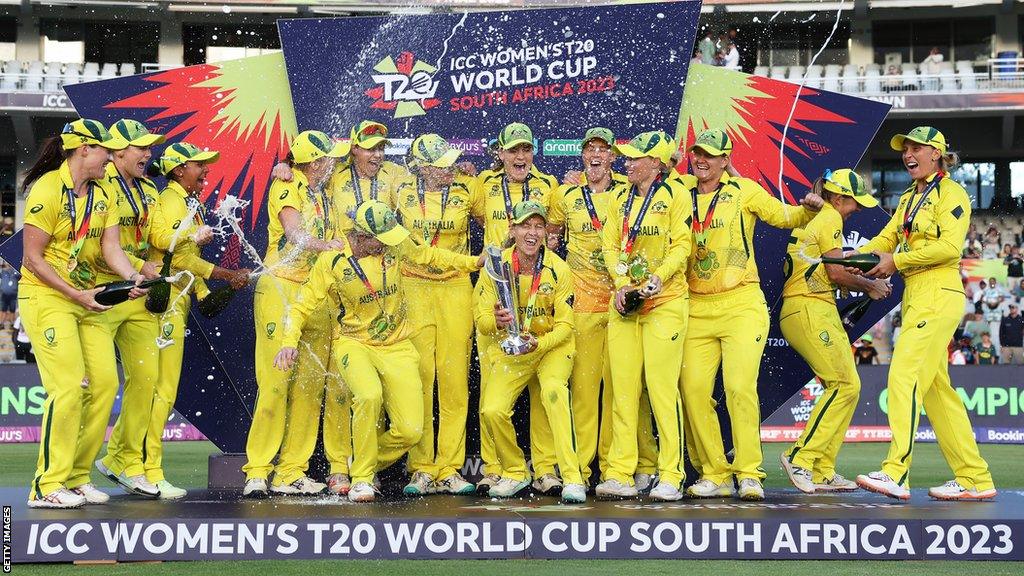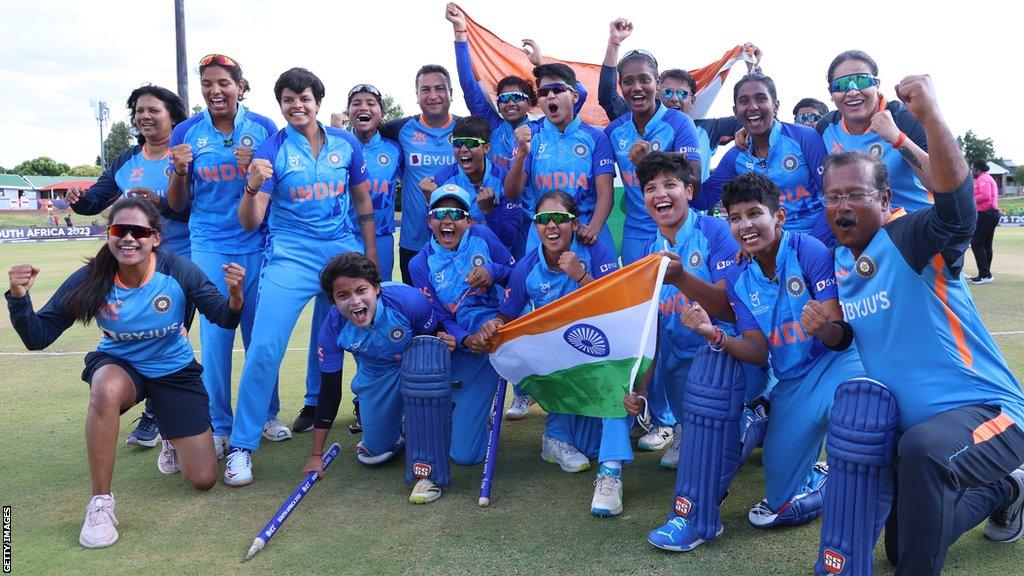Women's international & franchise cricket must 'coexist' says ICC's Snehal Pradhan
- Published

Australia won the Women's T20 World Cup for the third time in a row in February, which saw them continued their hold on both world titles and Commonwealth Games gold
"Peaceful Coexistence."
It was once a Cold War slogan. Now, it's the mantra of the International Cricket Council (ICC), as it figures out how the new Women's Premier League - which began in Mumbai on Saturday - will impact the existing women's cricket calendar.
"We need to learn from how things have panned out over the past 10 years in the men's game - it's an opportunity for us to get ahead and make sure that there is coexistence between these leagues and international cricket," says Snehal Pradhan, the ICC's manager of women's cricket.
The huge payday of the WPL has led to concerns that the league may eventually supersede international women's cricket, and cream off some of the world's leading talent.
England players Sophie Ecclestone (£180,000) and Alice Capsey (£75,000) are both receiving payments well in excess of the value of their ECB central contracts (approximately £60,000 annually). Nat Sciver-Brunt, who has pocketed £320,000, will almost certainly be the best-paid female team athlete in the UK this year.
But Pradhan says she does not see the league as a threat to international cricket: "One thing I can say for sure is that there is a great amount of national pride involved in representing your country and I think that's not going away any time soon.
"In the hearts of the players, international cricket is very much front and centre as things stand right now.
"We already have a Future Tours Programme [FTP] up until 2025, which ensures that international cricket is scheduled and all leagues that come up work with that schedule."
The ICC's first ever Women's FTP was unveiled last August, laying out the international obligations for all sides until the end of April 2025.
It includes windows for The Hundred, the Women's Big Bash League in Australia, and the WPL - though not for the new women's leagues in the Caribbean and Pakistan, nor for the FairBreak Invitational.
"The narrative of international cricket competing with franchise cricket is very strong in the men's game because the calendar is a lot busier," said Pradhan.
"In women's cricket, only a few countries choose to play Test cricket and that makes the competition for time not as big."
The Women's T20 World Cup and the inaugural Under-19 World Cup in South Africa showcased the recent growth of women's cricket.
A total of 69,914 people attended matches across the T20 World Cup, while - in a country where interest in women's sport remains low - there was a record crowd of 12,782 for the final at Newlands.
"It was a very, very satisfying tournament," says Pradhan. "The cherry on the cake was the home side in the final, and the fact that we filled up Newlands."
Pradhan - who represented India between 2008 and 2011 - relished seeing her home nation triumph in the U19 World Cup; but more so, the impact of the tournament as a whole.
"Suddenly, junior set-ups are appearing and being strengthened and more money and more resources are going into them across the cricketing world," she said. "The tournament has a wide footprint."

India beat England to win the inaugural Under-19 Women's T20 World Cup in January
Pradhan, who took over from former England spinner Holly Colvin as manager of women's cricket in November, became a journalist after retiring from cricket.
Now, she has the chance to impact on the sport from the heart of its governance structures.
"It was a no-brainer [to apply]," she explains. "One of my main motivations for getting into media after my playing days was to push the game forward, trying to make sure the girls get what they deserve.
"It's no different here, except the lens is now not just Indian but global. It's a great opportunity."
Of course, there are challenges too. Chief amongst them is ensuring that the women's game remains competitive beneath the three powerhouses of Australia, India and England.
A recent report, external by the Federation of International Cricketers' Associations (FICA) highlighted "significant inequality in overall global game economics", meaning countries like Bangladesh and Sri Lanka struggle to compete on the international stage.
"Trying to boost the competitiveness of international cricket is something I'm hoping to make a difference in," Pradhan says.
"It's going to be a slow burn process. It requires patience.
"We need to continue to give our member boards incentives and opportunities to invest in their women's cricket programmes."
The ICC has also come under criticism for its failure to act over the situation in Afghanistan.
Afghanistan was made a full member of the ICC in 2017, but this was conditional on having a women's team in place. Since the Taliban seized power in August 2021, women have been denied the right to access cricket, while members of the women's national team were forced to flee abroad in fear of their lives.
The situation will be discussed at a full ICC board meeting this month. But as an ICC employee Pradhan has no seat at that table.
"It's a huge concern for everyone at the ICC that things haven't moved much in the last 12 months," said Pradhan. "It's something that the board will take a decision on - it's an uncontrollable for me.
"One can hope that there is some kind of positive outcome which helps shift the reality, but it is a very complicated and much bigger than cricket reality."